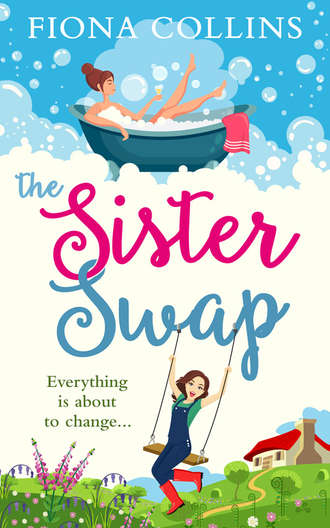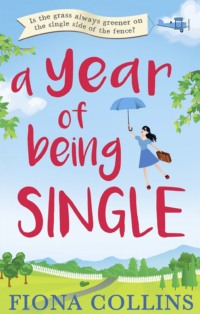
Полная версия
The Sister Swap: the laugh-out-loud romantic comedy of the year!

Two sisters. Two very different lives…
Meg simply doesn’t have time for men in her life. Instead, she has a strictly one-date rule, survives on caffeine and runs one of the biggest model agencies from her smart office in London. That is, until she collapses one day at work and the doctor orders her to take some R&R in the country…
Sarah is used to being stuck behind tractors and the slow pace of her cosy village life. But now her children are all grown-up (and her ex-husband long forgotten) she’s ready to change things up a bit – starting with taking back her old job in the city!
After a devastating falling out, the sisters haven’t spoken in years. Swapping houses, cars, everything is the only option – surely they’ll be able to avoid bumping into each other?
FIONA COLLINS
lives in the Essex countryside with her husband, three children and the noisiest cat in England. She likes to write feisty, funny novels about proper, grown-up women.
Fiona studied Film & Literature at Warwick University and has had many former careers including TV presenting in Hong Kong, radio traffic presenter and film & television extra. She has kissed Gerard Butler and once had her hand delightfully close to George Clooney’s bum.
You can follow Fiona’s witterings on Twitter @FionaJaneBooks or find her swanning around on Facebook at facebook.com/fionacollinsauthor
Also by Fiona Collins
A Year of Being Single
Cloudy with a Chance of Love
Four Bridesmaids and a White Wedding
The Sister Swap
Fiona Collins

ONE PLACE. MANY STORIES
Copyright

An imprint of HarperCollinsPublishers Ltd.
1 London Bridge Street
London SE1 9GF
First published in Great Britain by HQ in 2018
Copyright © Fiona Collins 2018
Fiona Collins asserts the moral right to be identified as the author of this work.
A catalogue record for this book is available from the British Library.
This novel is entirely a work of fiction. The names, characters and incidents portrayed in it are the work of the author’s imagination. Any resemblance to actual persons, living or dead, events or localities is entirely coincidental.
All rights reserved under International and Pan-American Copyright Conventions. By payment of the required fees, you have been granted the non-exclusive, non-transferable right to access and read the text of this e-book on-screen. No part of this text may be reproduced, transmitted, downloaded, decompiled, reverse engineered, or stored in or introduced into any information storage and retrieval system, in any form or by any means, whether electronic or mechanical, now known or hereinafter invented, without the express written permission of HarperCollins.
E-book Edition © June 2018 ISBN: 978-0-00-822156-0
Version: 2018-10-26
Contents
Cover
Blurb
Author Bio
Booklist
Title Page
Copyright
Chapter One
Chapter Two
Chapter Three
Chapter Four
Chapter Five
Chapter Six
Chapter Seven
Chapter Eight
Chapter Nine
Chapter Ten
Chapter Eleven
Chapter Twelve
Chapter Thirteen
Chapter Fourteen
Chapter Fifteen
Chapter Sixteen
Chapter Seventeen
Chapter Eighteen
Chapter Nineteen
Chapter Twenty
Chapter Twenty-One
Chapter Twenty-Two
Chapter Twenty-Three
Chapter Twenty-Four
Chapter Twenty-Five
Chapter Twenty-Six
Acknowledgements
Excerpt
Endpages
About the Publisher
Chapter One
Meg
‘Oi, oi! Had a good night, darlin’?’
Meg tried unsuccessfully to yank her dress in the vicinity of her knees. It didn’t want to cooperate and sprang back up. This showstopper of a dress – claret red, tight, sleeveless – wouldn’t be dragged down, unlike its owner, clearly. It was a dress for midnight. A dress for a bar or club or fancy restaurant. A dress for peeling off and throwing with abandon on the bedroom floor of a man you probably (no, definitely) wouldn’t be seeing again. Not a dress for skulking up a London street at 5 a.m. on a Friday in early June, your shoes in your hand.
‘Walk of shame, is it?’
Meg tried to ignore the muscle-bound builder with the large expanse of over-tanned man cleavage and the orange hard hat – an unfortunate throwback to the Village People if ever she’d seen one – who was shouting at her from across the street.
‘Sod off,’ she muttered under her breath. Meg tugged at her dress again and put her head down. She was hungover; it hurt. She pulled her phone from the gold clutch bag under her arm and pretended to examine it intently whilst Village Person and the rest of his crew – the only bloody builders in London who started at five in the morning, it seemed – laughed. Why, oh why did she get a night bus that dropped her at the end of the road, rather than a cab? Why, oh why had she gone back to Mikey (Matty?)’s flat in the first place? She navigated a broken beer bottle and a fag butt, her bare feet protesting at every step.
‘Looking fiiine, lady,’ catcalled another builder, sporting a leer and a Bart Simpson T-shirt. Meg had got the night bus because it stopped directly outside Matty’s? Mikey’s? flat. Mikey, that was it. She’d put his number in her phone last night, after six gin and tonics and some extensive work, on his part, to chat her up – not long before she’d gone home with him. As if on cue, his name flashed up on her phone now. She ignored it. She’d text him later. Tell him it was fun but it wouldn’t be going anywhere. It never did. Meg was a firm believer in never getting emotionally involved.
‘Mighty fine!’ echoed a fat Daniel Craig lookalike in a high-vis waistcoat and he gave a long, loud wolf whistle, which she wouldn’t have minded, during the day – she was thirty-eight; she took what she could get. As it was silly o’clock and she was highly inappropriately dressed, it really wasn’t that welcome. She really must stop having one-night stands with men she didn’t particularly like.
Meg allowed a woman in a suit on a Boris bike to overtake her. A car beeped and Meg resisted the temptation to give it the finger. She was home. She ran up the three steps to her dark-blue front door, turned her key in the lock and stepped inside with relief, before throwing her keys on the table and her sandals on the floor and padding on sore feet over to the kitchen – which she barely used apart from uncorking Prosecco over the sink and storing perfume in the fridge – and pouring herself a large glass of water.
She was supposed to be at work in precisely ninety minutes.
*
‘Morning, Julianna, can you call Mimi and check she’s OK for the 22.55 flight to Milan, and tell her she’s got to be sober this time? Thank you. Frank – nice jacket – can you ring Nigel at Balmuccia regarding the New York Fashion Week shoot and tell them, as politely as you can, they strictly only have Rose-Leigh for Tuesday until Thursday, then she’s got to be back in London for another job –I’ve just had an email from them about it, trying to extend again. They’re driving me mad! Julia, glad to see you back – do you have that fee negotiation document, please – the latest one? On my desk in five, please.’
Meg was marching through the office, heels clacking, cherry-red lippy on, hair in a messy blonde and caramel chignon, her phone in one hand and an emergency caramelized pecan latte in the other. Her walk of shame forgotten, she was now on her usual power walk into the office, the walk on which lots of things got done. ‘Good morning, Frances, did you hear back from Cassie re. the Miami job – is she available? How about that girl we scouted – Poppy – when are she and her mother coming in? Can you please let me know as soon as?’
Meg was speed-reading emails as she clicked across the black, polished floor. She was ignoring her banging head, her slight nausea and the fluttering heart palpitations she blamed on the third latte of the morning. She was glad of her crisp, white cotton wrap dress, keeping her cool, as it was unusually hot in here. And her sunglasses, which she would keep on until at least ten o’clock, were successfully hiding all traces of bloodshot eyes.
She wouldn’t admit it to many, but her eyes had actually been red and wild-looking long before her caning it on gin last night; she’d spent most of the last crazy two weeks surviving on Starbucks and energy drinks, the odd canapé (literally) thrown in. Not out on the lash, she would hasten to tell you – yesterday’s drunken excursion was a now-regretted, temporary release, as was the man whose name she’d now completely forgotten – but working late, in the office. Tempest Models was her company; she had to. If she didn’t then she feared things Wouldn’t Get Done. They had a lot of big contracts on for their models at the moment: Meg had averaged five and a half hours’ sleep a night for the last fortnight.
She’d burnt the candle at both ends and halfway down the middle, before chucking it churlishly in the bin. She’d run, walked, negotiated, everything, on empty.
Waiting for her at the end of the huge open-plan office, under Tempest’s huge wall of models’ photo, or ‘comp’, cards, was her desk, a super-neat, gleaming specimen of white and chrome, and three days’ work, once again, to be done in one day.
‘Morning, Meg.’
‘Morning, Lilith.’
Lilith, Meg’s assistant – pinafore, ankle boots, gamine Mia Farrow haircut – was standing in the doorway of the small corner office behind. It was supposed to be Meg’s, but she preferred to be out on the floor, where she could see everyone, so they had swapped.
‘Another busy one today?’ Lilith enquired. ‘I’m ready for whatever you have to throw at me.’
‘Oh, there’ll be plenty,’ replied Meg, with a bright smile. ‘Thanks, Lilith. It’s going to be super busy.’
She placed her coffee on the desk and her bag under it. Without sitting down she leant over and tapped her computer into life. As owner and Head Booker, her inbox was full – both email and the physical one on her desk – she had a list of phone calls to make as long as your arm, five meetings, and after work she was going to Westfield shopping centre for drinks with a client and a little recreational scouting. There was no time for that in office hours: she did her spotting of upcoming talent after hours and she was very, very good at it. Britain’s top three models in the last ten years – including Clarissa Fenton-Blue, the darling of both Gucci and Calvin Klein – had all been discovered by Meg.
‘Twit!’ she scolded herself. She realized she’d actually placed her bag on the desk and her coffee on the floor. ‘Silly cow.’
She bent to retrieve the cup, put it next to her bag, and then, to her complete surprise, everything went kind of ‘whoosh’ and ‘fade to black’ and Meg, quite theatrically and almost gracefully, if she could have seen it to have appreciated it, collapsed like a folded envelope onto the polished black surface of her office floor.
*
She awoke, sometime – a long time? – later, blinking, with a white ceiling above her, the faint smell of disinfectant in her nostril and a feeling of overwhelming, bone-shattering tiredness. Where the bloody hell was she? Was she in a bed? She used her fingertips to feel the material under her hands, which were at her sides. Some kind of cotton, with a scratchy, crackly something underneath. She wriggled her toes. They were under constraint, held by a starchy, apple pie tucking in. Holy hell – was she in hospital?
A face – soft cloudy hair, rectangular glasses with navy frames – loomed into shot.
‘Hello … ?’ muttered Meg hoarsely. She tried to sit up but realized she didn’t have the energy. The pillow hurt under her head – everything hurt.
‘Good morning, Miss Oxbury,’ said a cool voice, above a white coat and a stethoscope. ‘I’m Doctor Field. You’re in University College Hospital. You collapsed at work. Fainted. Do you want some water?’
Meg nodded and the doctor handed her a blue plastic lidded cup with a straw sticking out of the top from which Meg took a couple of grateful sips.
‘I’m so sorry. I had too much to drink last night,’ whispered Meg, her throat sore and her mind racing. She’d collapsed? ‘And I haven’t really been eating that well recently—’
‘Neither would have helped,’ interrupted Dr Field, ‘but they’re not the reason you fainted. You’re suffering from hypertension.’
‘What’s that?’ asked Meg. She’d heard of it, vaguely. Probably via Holby City. She felt sleepy and wanted to close her eyes.
‘High blood pressure.’
‘Oh.’ Hell! High blood pressure! That wasn’t good.
‘Dangerously high. So much so, I’m afraid I’m signing you off.’
What? Meg’s weary and befuddled brain tried to compute the doctor’s words. Signing her off? Was that the same as writing her off? Was she going to die?
‘What do you mean?’ a stricken Meg asked.
‘I’m signing you off work. For eight weeks.’
Meg would have burst out laughing, if she’d been physically capable of it. ‘Don’t be ridiculous!’ she croaked. ‘That’s two months! I can’t be signed off work for two months! – I’ve got far too much to do!’
‘Which is precisely why I’m signing you off,’ said the doctor, in clipped tones. ‘You’re highly stressed and you have hypertension. You’re not going to be working for the next eight weeks and, ideally, I want you out of London.’
Meg started to panic. She wished she could heave herself up to a sitting position; she needed to prove she was perfectly OK. ‘But it’s my company!’ she protested. ‘I can’t just bugger off and leave everyone to get on with it! And what do you mean, out of London? Where on earth would I go?’
London was her life. She loved London. She loved Tempest Models. She didn’t want to leave either. This was ludicrous!
‘To the country, to the coast, to a nice quiet field somewhere … take up knitting, fall in love, whatever. I’m insisting on it, for the good of your health. You need to get away and it has to be right now. This weekend.’
‘I don’t believe in love,’ muttered Meg. ‘And I don’t want to get away.’ This was a disaster. An absolute disaster.
‘You have to,’ said the doctor firmly. ‘Don’t you have anyone you can call? Parents, siblings, friends in the country, or somewhere, who can put you up?’
‘No, there’s no one,’ replied Meg, shaking her head. ‘Everyone I have is in London.’
‘Go and stay in a hotel then, or a B&B,’ said Dr Field distractedly. Something was buzzing in her pocket. ‘Right! I’m putting you on a course of tablets and by Monday I expect you to be on a beach in the Bahamas, or, at the very least, in the New Forest.’ The doctor was halfway out the door.
‘I can’t afford either,’ muttered Meg. Despite business being good, all money being ploughed back into the company meant she could barely manage the rent on her ridiculously expensive, just-off-Tottenham-Court-Road flat, let alone pay out for an additional place to live for the next two months.
‘Goodbye, Miss Oxbury.’
‘Goodbye,’ Meg mumbled weakly, but the doctor was already gone. She slumped back on the pillow. Eight weeks off work and enforced exile from London. This was a complete nightmare and actually completely impossible.
How could she get out of London when she didn’t have anywhere to go? There were no lovely parents in the country. No friends with coastal retreats. As she’d said, anyone who meant anything to her lived in London.
The only person she knew who lived in exactly the kind of place Dr Field was talking about, Meg really didn’t want to see.
Chapter Two
Sarah
Sarah idly scratched her left bum cheek under the flimsy material of her cotton shorts and stretched her right arm out into the warm, unmown grass. A plump bumble bee was nuzzling in some clover just beyond her fingertips; she admired his wriggling, furry form, his rotund work ethic, his purpose. The faint pong of distant manure nudged at Sarah’s nostrils. An ancient transistor radio stuck wonkily on the ground competed for her attention with an overhead wood pigeon. Smooth FM, the oft-repeated jingle kept proclaiming; music to fall asleep to. She thought so, anyway. The Carpenters were singing about rainy days and Mondays when today was hot, sticky, with no breeze, and Friday. Not that it mattered much to Sarah what day it was, when they had all pretty much merged into one this summer.
She had been drifting on and off all afternoon, in a languorous haze – very easy to do in her little orchard to the rear of her cottage, especially when it was this sunny and warm. In between snoozes she’d consumed three Magnums – dark chocolate, she might hasten to mention; they were clearly much better for you – and half a packet of custard creams. She really must stop adding those to the online shop, she thought; the twins didn’t even like them any more.
She considered letting her eyes lazily close once more, but her phone, a little away from her outstretched hand and half concealed by fat blades of grass, lit up suddenly and started angrily buzzing. Who could that be? Connor, needing to be picked up from his job at the factory because he’d got another puncture on his bike? Olivia, saying she was at a friend’s and wasn’t coming home for dinner again? Or her boss, Mandy, recruiting her for another hateful stint in her local job as second-in-command children’s party host? Sarah had better answer it. She reached for the phone with the tips of her fingers and slid it towards her.
The name flashing on the screen was Ginny Mulholland. At first Sarah didn’t recognize it, then, with a start, she twigged.
Sarah sat up, knocking her tall, half-drunk glass of cloudy lemonade all over her battered, thrown-off flip-flops and part of her left foot. A wasp immediately began to swarm close to it and Sarah swatted it frantically away.
‘Hello?’ She stood up and turned in the direction of the manure pong and Westins Farm, somewhere behind the orchard, where a tailwind from the pine trees sometimes made the mobile signal better than hopeless.
‘It’s Ginny! Ginny Mulholland. From House Events.’ The woman’s chirpy voice sounded like it was being buffeted through a wind tunnel, and Sarah was extremely surprised to hear it at all. She hadn’t expected to hear from Ginny again; she’d expected a polite rejection letter in the post and a good chuckle to herself at her own ridiculousness for applying for her old job. ‘How are you?’
‘Fine, thanks, Ginny,’ she replied, her voice shaking a little. ‘You?’
Sarah’s ridiculousness had happened during a very similar lazy afternoon in the orchard, in May, when she was reading the paper and eating more biscuits. She was crazy to even have it catch her eye, really – that ad in the Temporary Job section of The Guardian – but somehow, in a moment of absolute madness, Sarah had applied for an eight-week contract for the job she’d done twenty-five years ago. At the same company. In London. She’d almost laughingly emailed her CV before she’d had time to talk herself out of it: a hastily cobbled-together CV, done on her crossed legs, on the laptop, which stated she had been Events Organizer for House Events, London, for five years, from the age of twenty-one to twenty-six. A reign that culminated in a National Events Organizer award for Sarah, given to her at the Royal Albert Hall, just before she had to give it all up. She almost couldn’t explain why she’d sent it.
‘I’m marvellous. I’m calling from the tarmac!’ trilled Ginny. ‘Just leaving the Caymans by helicopter!’
Ginny had spoken to Sarah from the Caymans three weeks ago. An impromptu Skype interview had been conducted from her sun lounger, framed by an infinity pool and a magnificent sunset, from what Sarah could see, whilst Sarah had struggled to unearth a non-messy corner of her house for a backdrop, plumping for the front door of the fridge … after she had hastily slung some random and far-from-aesthetic fridge magnets to the sticky floor.
Boredom was why she’d done it. Why she’d sent the CV. Sarah was bored, bored, bored. Bored of wellies, of picturesque sunrises across the fields, of tractors, of puddles, of her cottage and the view from her bedroom window. Of the village she had been brought up in. Of the organized chaos. Of dressing up as Elsa or Belle or Spiderman and serving plates of jam sandwiches and cheesy footballs at children’s parties. And the twins no longer needed her, not really – they were nineteen, Olivia had nearly completed her gap year and was off to university in the autumn and Connor had his little local job, hopefully progressing to something decent later on (at least she sincerely hoped so). The pair of them now just bellowed ‘Mum!’ at her from far corners of the house, when she was on the loo, out of habit.
Sarah also wanted to do something for herself. Get her life back, somehow, however temporary. Get herself back. So, yes, indeed, it had been a moment of madness. What woman ever manages that, really – after children, motherhood and a soul-destroying marriage … even if that was a million years ago.
The exciting, transatlantic Cayman Islands to Tipperton-Mallet-in-Suffolk interview had gone fairly well, Sarah supposed, although Ginny kept getting distracted by ‘Bertrand’, a young man who hovered behind her in budgie smugglers and constantly interrupted to ask if she was coming to the beach and what time was lunch. Sarah answered all Ginny’s questions as best she could and had even made her laugh a shrill, tinkly laugh a couple of times, but Sarah had heard nothing from Ginny since. She had assumed her old company, House Events, were just going through the motions in interviewing her at all – fulfilling their positive discrimination quota whatnots in being seen to not exclude late forty-something women who had seen better days. She’d assumed she hadn’t got the job.
‘I’ll cut to the chase,’ trilled Ginny, ‘as I’m being called to board. We’d like to offer you the job.’
‘Sorry?’ Sarah felt like she may pass out. What?
‘I said I’d like to offer you the job!’
‘Really?’
Sarah was flabbergasted. She was also, suddenly, not bored, or feeling redundant, or like she wanted to get her life back, but petrified. She was forty-eight. She wouldn’t know the Tube map now if it came up and bit her on the backside. The only thing she’d organized herself in twenty years was Tipperton Mallet’s weekly art class and the tiny village phone box library. She didn’t own a pair of heels, or even a smart jacket. She wore wellies and cagoules. She had ‘it’ll-be-all-right’, short Mum hair and a face devoid of make-up because she long since couldn’t be arsed …





